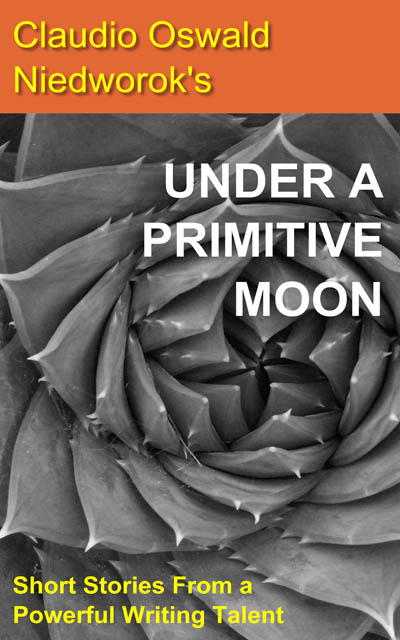Claudio Oswald Niedworok
Review of Claudio’s E-Book “Under A Primitive Moon”

by Alan R. Hall – theatre critic and literary reviewer
Under a Primitive Moon is quite an apt title for this series of stories. It conjures up images of roaring fires on dark nights, perhaps with people swapping stories; or, more likely, someone casting spells. And I do not mean the good kind.
Claudio tells us these are early stories; nevertheless his writing style is already acutely developed. Claudio never lets go of the narrative; we move swiftly through only that exposition that centers the story. A good example is the description of the murderous wood in Knives of Wind; we feel what the good doctor feels, but it cannot pull us away from the action.
Whether the author populates his tale with many people, or only a few, we have no problem at all conjuring up an image of any character. My favorite one is the old man who is accosted in the bar. It feels as if we know this man, and how much it would take to provoke him. I can almost hear his thoughts: “taking you out, mister, could well kill me; but, by God, I’m taking you with me!”
These tales all have their dark overtones; but there is an innate sense of justice here, as well. Evil as these deeds may be, there is always justice at the end – be it divine or otherwise. So even if the skin crawls, there is a satisfaction that comes with reading these stories. Claudio is, first and foremost, a storyteller. If his methods tend to be picturesque, all the better; his style is not at all the humdrum, nor the commonplace. Be it on a boat out at sea, a plane in the sky, or a seedy bar in a port, somewhere, you are there, and your eyes stir your other senses. One can taste the salt air, hear the crowd around about him, or smell the rich, steaming earth. It is this terse yet highly descriptive narrator driving you to turn the next page, discover the next scene, hear the next noise. You find you can’t help yourself. That is a quality rare in a writer; and a coveted one, at that.
Even if you had never read any other works by Claudio, there would be no trouble in ascertaining that in this breast beats the heart of a poet; to be able to paint so complete a picture with so few words requires nothing less. It is this that makes us follow him down such dark passages; we trust we will come out safely on the other side. A touch bruised, mayhap; but wiser, nonetheless. Were we to arrive at the end completely unscathed, well – where’s the fun in that?
